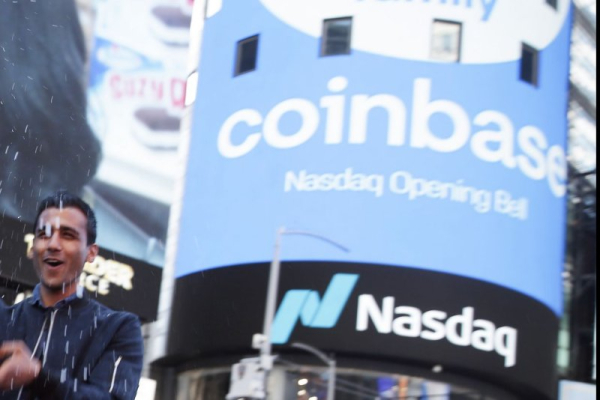
Employees and supporters of Coinbase appear at the Nasdaq MarketSite where the Coinbase logo is displayed on screens in Times Square on April 14, 2021. A British Watchdog fined the Coinbase Group on Thursday. File Photo by John Angelillo/UPI | License Photo
Britain’s Financial Conduct Authority fined Coinbase’s British unit regularly ignoring a requirement that prevented the company from offering services to high-risk customers.
The authority fined Coinbase’s CB Payments Limited $4,516,736, saying it onboarded 13,416 high-risk customers despite entering into a voluntary requirement with the FCA in 2020 after the regulator expressed concerns about the effectiveness of its financial crime controls. Advertisement
“The money laundering risk associated with crypto is obvious and firms must take them seriously,” Therese Chambers, joint executive director of enforcement and market oversight at the FCA, said in a statement,
“Firms like CBPL that enable crypto trading need to have strong financial crime controls. CBPL’s controls had significant weaknesses and the FCA told it so, which is why the requirements were needed. CBPL, however, repeatedly breached those requirements.”
About 31% of the customers deposited about $24.9 million and used the funds to make withdrawals and complete multiple cryptoasset transactions through other Coinbase Group entities totaling about $226 million.
CBPL operates a globally accessible cryptoasset trading platform, allowing customers to trade cryptoassets through other entities within the Coinbase Group. The company is not registered to deal cryptoassets in Britain. Advertisement
Coinbase pushed back, saying it has incorporated broader regulations than the FCA and it takes its implementations “very seriously.”
“CBPL continues to proactively enhance its controls to ensure compliance with its regulatory obligations,” Coinbase said, according to CNBC. “In its notices, the FCA acknowledged this as well as CBPL’s co-operation with its investigation.”
CBPL admitted that it “unintentionally onboarded” some customers identified as “high-risk” from 2020 to 2023, but those mistakes represented only 0.34% of all customers who signed up for the unit.